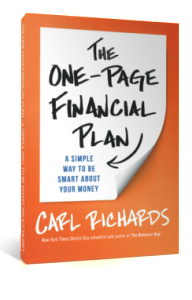 On the blog of late in our non-linkfest posts we have been spending less time talking about traditional investing topics and more time on issues dealing with more personal finance-related topics. For example, posts on aligning your goals with your finances, the value of mindfulness, making your savings goals stick and the need for humility have been fun to write.
On the blog of late in our non-linkfest posts we have been spending less time talking about traditional investing topics and more time on issues dealing with more personal finance-related topics. For example, posts on aligning your goals with your finances, the value of mindfulness, making your savings goals stick and the need for humility have been fun to write.
The timing is therefore perfect to present a Q&A with Carl Richards of the newly published book, The One-Page Financial Plan: A Simple Way to Be Smart About Your Money. You may know Carl from his Behavior Gap blog, his column at the New York Times or his first book: The Behavior Gap: Simple Ways to Stop Doing Dumb Things with Money.
Carl’s book is really for every adult because it addresses the most fundamental issues we have with money, spending and investing. Most importantly it makes addressing our financial lives seem achievable. One of the biggest issues I see, and Carl addresses, is the fact that smart, middle class people a hard time even taking those first few, tentative steps towards creating even the most rudimentary financial plans. One-Page Financial Plan: A Simple Way to Be Smart About Your Money plan does exactly that.
I had the opportunity to send Carl some questions about his book when roughly break down along the three sections of his book that address: discovering our financial goals, spending and saving and investing. Today four questions about investing.
—–
AR: So many financial problems stem from poor housing decisions. I like that you give permission to people to not have to own a house. What I found interesting was that you put a chapter on paying down debt as an investment. Why don’t most people think about in those terms?
Carl: It took me a while to think about it in those terms, but the math makes it clear. You’ve got a dollar, and you’re going to put work, but you want to put it where it will work the hardest. In many instances, that best place is paying down debt. We just need to reverse our thinking a bit. Every dollar you use to pay down debt saves you the 18.24% you’d otherwise pay in interest. That’s a guaranteed return on every dollar you pay down. How is that not an amazing investment?
AR: It seems that your prescriptions for investing, low-cost, diversified portfolios, are tailor-made for the new batch of so-called “robo-advisors.” From what you have seen do the these new firms provide for most investors “good enough advice”?
Carl: There’s no question that these new firms we’re referring to as “robo-advisors” build great portfolios, but so does the Vanguard Target Date Funds. And they’ve been doing it for a long time, so this isn’t a new idea, but it’s now in a fancier wrapper. Building a “good enough,” even great, portfolio, is now a commodity. We’ve got to be clear that whether you go to a robo-advisor or to the industry default of some place like Vanguard, the bigger question we need to ask is whether we can behave. Building a portfolio is easy. Behaving is the difficult part.
AR: Another of the themes of your book is about making good enough decisions that we revisit on a regular basis. However since we are all emotional creatures when it comes to money this does not prevent us from making big, bad decisions. Is that the best argument for having an advisor, of whatever flavor, act as a check-and-balance on big money decisions?
Carl: Definitely! I share this story in the book, but it’s a favorite. A friend of mine, a retired investment banker, went looking for an advisor. When I asked him why, he said, “I could manage my own money except for the ‘I’ part.” He understood something that all of us need to learn. We have these blind spots. We don’t need to hire an advisor because we aren’t smart enough or we’re not successful enough. We need to hire an advisor because they aren’t us, and it’s really hard to make unemotional decisions about our own money. We need that objective third party to help us behave.
AR: There’s no magic in financial planning. No silver bullet. In your book you give people permission to simply “have a plan.” Isn’t planning really about making the implicit, explicit?
Carl: Yes, planning is the result of taking what might otherwise be only a wish and making it a specific set of goals. We’re doing something on purpose instead of just wandering aimlessly and being pushed around by every wind or doctrine that comes our way. Planning is about charting a course, heading in that direction, and course correcting as we go.
—–








